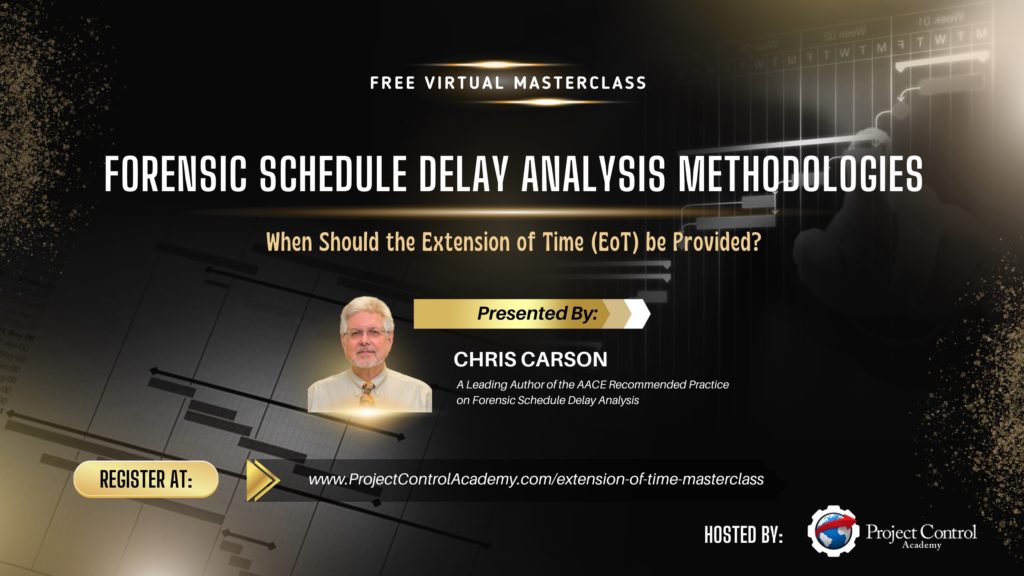Summary:
Are you interested to know what internationally recognized certifications are available in Cost Estimating?
There are several Cost Estimating associations that provide a variety of Cost Estimating certifications:
- ICEAA’s Professional Cost Estimator/ Analyst (PCEA®)
- AACE’s Certified Estimating Professional (CEP)
- ASPE’s Certified Professional Estimator (CPE)
- ICEAA’s Certified Cost Estimator/ Analyst (CCEA®)
Watch this video to learn the requirements for each certification and which certification(s) you can pursue as a Cost Estimator.
Download the free audio mp3 podcast of this episode on iTunes.
Like this episode? Please share it so others can also benefit from it.
Want more training? Subscribe to Project Control Academy to receive complimentary training videos and resources delivered to your mailbox.
Project Control Quotes to Consider: Join Project Control Academy on Instagram for tons of great quotes.
Video Transcript:
Are you interested to know what internationally recognized certifications are available in Cost Estimating?
There are several Cost Estimating associations that provide a variety of Cost Estimating certifications, so you might be interested to know which certifications you can pursue as a Cost Estimator.
If you are a Cost Estimator practitioner, I highly encourage you to consider acquiring the certification in Cost Estimating. The reason is that many companies and government agencies in the United States and around the world are starting to require these certificates for cost Estimator practitioners. For example, construction estimates for government projects in the state of California must be prepared by, or under the direct supervision of, a Certified Professional Estimator.
Nowadays, more and more companies see the value of you being certified. That’s why a significant number of job postings in Cost Estimating require professional certification as a job requirement.
Besides fulfilling a job requirement or enhancing your resume with your certification, you gain more benefits from obtaining a professional certification. What benefits?
Well, most of the professional certifications expire after a certain period of time, normally three to five years.
You might be wondering, “what kind of benefit I gain by having my certification expire after a short period of time?!”
Your certification expires after, let’s say three-year time frame, and to re-certify you need to prove to the related Cost Estimating association that you have gained the required knowledge and you have accumulated some continuing education points that qualify you for re-certification. This recertification process will keep you on a continuous treadmill of learning and growth in your career as a Cost Estimator. That’s why the benefit of being certified in Cost Estimating will come back to you ten-fold.
I hope you are convinced now why I highly encourage you to consider pursuing one of the certifications in Cost estimating that I’m going to show you.
Are you ready to know what Cost Estimating certifications you can pursue?
Okay, let’s go for it.
Cost Estimating Certifications
Professional Cost Estimator/Analyst (PCEA®)
The Professional Cost Estimator Analyst or PCEA® is offered by “International Cost Estimating and Analysis Association”, ICEAA.
If you are a Junior Cost Estimator, this certification is something that you can consider because it doesn’t need many years of experience. All it needs is only two years of cost estimating experience and a bachelor’s degree.
If you don’t have a bachelor’s degree or a four-year college degree, then you need to have five years of experience in cost estimating or related field.
Satisfying the requirements of the PCEA® certification is easy. Therefore, if you’re someone new to Cost Estimating, you can consider this certification.
In addition to the experience and education criteria, you also need to pass a certification exam.
Once you pass the certification exam, you need to re-certify after five years and for doing so you need 30 points. These points can be gained by attending seminars, taking courses…in Cost Estimating subjects.
To learn more about the Professional Cost Estimator/Analyst (PCEA®) certification, please visit the ICEAA site.
Certified Estimating Professional (CEP)
The Certified Estimating Professional or CEP certification is offered by the “Association for Advancement in Cost Engineering” or AACE International.
Let’s see what the criteria for this certification are and whether or not you meet those criteria.
The first criterion is having four years of Cost Estimating experience and a bachelor’s degree. If you don’t have a bachelor’s degree, then they need eight years of industry-related experience.
If you are an Intermediate Cost Estimator, with 4 to 8 years of experience, you can consider pursuing this certification. You also need to pass a certification exam, which usually has around 120 multiple-choice questions and memo writing at the end.
Once you pass the exam and become certified, just like other professional certifications, you need to re-certify, after three years in this case. To do so, you need 12 CEUs or continuing education units; otherwise, your certification will be expired.
If you are interested in the Certified Estimating Professional (CEP) certification, make sure that you check the AACE website.
Certified Professional Estimator (CPE)
The Certified Professional Estimator (CPE) certification is offered by “American Society of Professional Estimators”, ASPE.
Let’s review the requirements for this certification.
The CPE Certification needs more years of experience; minimum of five years’ experience in Cost Estimating. Furthermore, you need to verify your experience with your employer. Your resume or your application alone doesn’t qualify your work experience. You need to verify your experience with your employer in the past five years or what you identify in your application. Not only that, but you also need to write a technical paper on Cost Estimating.
Once you satisfy these requirements, you can sit on the exam! When you pass the exam, you will be recognized as a Certified Professional Estimator (CPE).
Your journey doesn’t end here. Every three years, you need to renew your certification. Recertification requires 30 professional development units or PDUs.
If you are interested in pursuing this certification, check ASPE website for more details.
Certified Cost Estimator/Analyst (CCEA®)
The Certified Cost Estimator/Analyst (CCEA®) is offered by “International Cost Estimating and Analysis Association”, ICEAA.
For getting this certification, you need a minimum of five years cost experience and a bachelor’s degree, or eight years of experience if you don’t have a four-year college degree.
You also need to pass the certification exam, and once you pass it, to re-certify you need to have 30 points of continuing education within five years.
If you are interested in this certification, please visit the ICEAA website for more information.
In summary, the recommended internationally recognized certifications on Cost estimating includes:
- Professional Cost Estimator/Analyst (PCEA®)
- Certified Estimating Professional (CEP)
- Certified Professional Estimator (CPE)
- Certified Cost Estimator/Analyst (CCEA®)
If you are a Certified Cost Estimator and have gone through the certification process, please comment below and tell us which certification you’ve got and what advice you have for the community. If you have any preferences or suggestions regarding the certifications in Cost Estimating, please make sure that you write your comment down below this video.
I have to remind you that, although I listed the criteria for each certification in this post, they might change without any notice. So, make sure that you check the associations that provide those certifications to get the most recent information.
 Interested in learning more about how to succeed as a Cost Estimator and Project Controls in general?
Interested in learning more about how to succeed as a Cost Estimator and Project Controls in general?
Make sure that you check the “Project Control Success Roadmap Training”, where you learn various roles that you can play in Project Controls and how to succeed in each role to step up the ladder of success in Project Controls.
If you have any question, please jog them down below. I will make sure that I will go through as many questions as I can and assist you in answering your questions.
If you have any comment, if you have gone through those certifications or have any suggestion for other people in the community, again, make sure that you post your comments down below.
About the Author, Shohreh Ghorbani

Shohreh is a licensed project management professional (PMP) recognized by Project Management Institute (PMI) and holds a Master of Science in Industrial Engineering.
Connect with Shohreh via Facebook, LinkedIn, Instagram, YouTube





![[Free 90-min Masterclass] The Ultimate Leadership Recipe for Project Professionals](https://www.projectcontrolacademy.com/wp-content/uploads/2024/08/4-1024x576.jpg)















